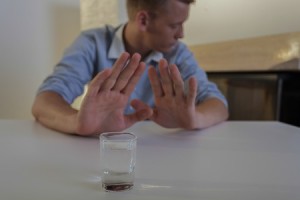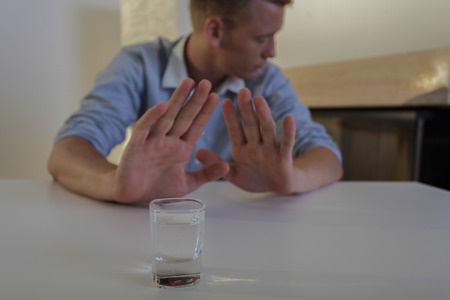
There is an existing generic medication called baclofen, a muscle relaxant, which has been primarily used to treat spasticity and multiple sclerosis. Now it is in the early research stages as a treatment for alcoholism. Olivier Ameisen, a French-American cardiologist used himself as guinea pig in testing baclofen to treat his own alcoholism. He said that baclofen saved his life by freeing him of all cravings for alcohol and suppressing his addiction. He’s written several journal articles and a book, The End of My Addiction, describing his active drinking and how baclofen helped him stop. Ameisen died of a heart attack on July 18, 2013, but his “discovery” lives on. Let’s see if it is a miracle treatment; or not.
First we will summarize his experiences by looking at The End of My Addiction and an article he wrote for the journal, Alcohol and Alcoholism about nine months after his “complete liberation from symptoms of alcohol dependence.” Afterwards, we will look at some of what the research literature has to say about baclofen.
Ameisen said he began to struggle with symptoms of alcohol dependence in the 1990s. In his struggles to stop drinking, he had numerous emergency hospitalizations, emergency room visits, detoxifications, and years of both inpatient and outpatient rehabilitation services. Because of his persistent and strong cravings for alcohol he tried disulfiram (Antabuse), but drank on it. He tried Naltrexone and acamprosate, which didn’t stop his cravings or his relapses. He achieved periods of prolonged abstinence, but always struggled with cravings and a preoccupation with alcohol.
He attended Alcoholics Anonymous—sometimes as often as two, three or four meetings a day. He had a sponsor and a home group. Twice he did a “90 in 90,” attending ninety meetings in ninety days. He achieved prolonged periods of abstinence, but continued to relapse. By his estimate, he attended roughly 700 meetings a year, over a period of 7 years between 1997 and 2004. But until he began using baclofen to treat himself, he was unable to maintain abstinence.
Ameisen noted that physicians are notoriously bad patients “who often inhibit their recovery by trying to run their own cases.” And he seems to have been one of the worst. Long before he experimented with baclofen, he preferred to administer his own detox at home after his binges. He objected to CPH (the Committee for Physician Health of the New York Medical Society) refusal for him to continue using benzodiazepines for his anxiety. “Being denied a standard medication for severe anxiety, the condition that triggered and fueled my craving for alcohol, was at best counterproductive and at worst callous and cruel.”
He moved back to France in 1999, where he continued to drink off and on; and continued to seek help to stop his drinking. His binge cycles became shorter and shorter. A treating psychiatrist told him he was afraid he would not live much longer. In the midst of a binge, a friend from New York sent him an article on baclofen treatment for cocaine craving she saw in the New York Times. He was in the midst of a binge and misplaced it. A year later in November 2001 he remembered the article and had the friend track it down and send him another copy. Thus began his investigation and growing belief that baclofen could be a treatment for his alcoholism.
He contacted the doctor mentioned in the New York Times article. In February of 2002 he bought a PC and began to search the internet for information on “baclofen and panic.” He added “baclofen anxiety;” and finally baclofen alcohol.” This led him to a 2000 research article written by an Italian researcher, Giovanni Addolorato on the ability of baclofen to reduce alcohol craving and intake. Ameisen checked with a neurologist friend who told him it was a safe drug; not addictive (Baclofen is not a controlled substance, but can impair thinking or reactions. Withdrawal can result in seizures and hallucinations in some long term users). He decided to order some baclofen and try it on himself. In The End of My Addiction, Ameisen wrote:
Until this point, I had steadfastly tried to be a good patient and had avoided benig my own physician, but it seemed to me that in order to save my life from alcoholism, I had no choice but to risk walking out onto a tightrope without the normal safety net of another physician’s supervision.
This seems to be an inconsistent memory by Ameisen. He had been acting as his own doctor from the time of preferring his own detox at home. Nevertheless, he started using baclofen on March 22, 2002 and gradually increased his dose to 180 mg daily. He found some immediate relief of his muscular tension. He slept better and felt calmer. But he continued to binge drink and he continued to do research into baclofen. Eventually he saw an animal study that suggested even higher doses of baclofen could suppress cocaine intake in rats addicted to cocaine. “The more I learned, the more I came to believe that at a high enough dose of baclofen, I too could reach a point where I would lose the motivation to consume alcohol.”
Then on January 8, 2004, he decided it was now or never. “If I continued to follow my doctor’s advice and the conventional treatments for alcoholism, I was going to keep lapsing into binges and eventually die from drinking. I had to take my treatment into my own hands.”
From the first day, he reported his anxiety was substantially reduced and his sleep became restful. By the 37th day on 270 mg of baclofen, “I experienced no craving or desire for alcohol for the first time in my alcoholic life.” He reported that even in a restaurant with friends, he was indifferent to people drinking. Drowsiness became an inconvenient side effect, so he tapered his dose down to 120 mg per day from days 49-63 of his abstinence from alcohol. He stabilized at that dose, with occasional additions of 40 mg as needed in stressful situations.
At first he avoided situations and places where alcohol was present. But then believed he did not have to be concerned about this. Even when socializing with friends who were drinking, he had no cravings for alcohol. He realized he was “completely and effortlessly indifferent” to alcohol. He was encouraged by a friend and physician to write a paper of his self experiment, which was eventually published in the journal Alcohol and Alcoholism. In the article he said:
At the end of my ninth month of complete liberation from symptoms of alcohol dependence, I remain indifferent to alcohol. Abstinence has become natural to me. I no longer plan my life around alcohol. Alcohol thoughts no longer occur. . . . I no longer suffer anticipatory anxiety of relapse, of embarrassing or dangerous alcohol-related situations. I am no longer depressed about having an incurable stigmatizing disease.
Eventually he wondered if he was vulnerable to relapse. “Would one drink plunge me back into the hell of alcoholism?” So in May of 2005, sixteen months after his abstinence with baclofen, he decided to put his recovery to the test with three successive challenges.
First, while continuing his maintenance dose of 120 mg of baclofen, he had three standard drinks over a few hours at a social gathering. He didn’t guzzle his first drink. He also didn’t finish his third drink. The second test was increasing his alcohol intake to five standard drinks over a six-hour span. Again, he had no urge to drink rapidly and experienced only a mild euphoria. But the following afternoon, he had a serious craving that he said an additional dose of 40 mg of baclofen suppressed within an hour.
His final test was to consume a massive amount of alcohol; similar to that he ingested during active relapse. Over an evening, he drank about 600 milliliters of Scotch. The next day he had a mild hangover, but no cravings. “It was good to discover that with baclofen I could drink in a nondependent way.” On occasions he said he would have a glass or two of champagne or a mixed drink. But he preferred to not drink. In a 2010 article for The Guardian, James Medd, reported Ameisen can now even drink socially. “I became disease free-free,” he said.
After his “self-case report” was published in Alcohol and Alcoholism, it didn’t cause much professional excitement. “But he found that potential patients were much more interested.” After two unsuccessful years of trying to work up interest within the medical system, Ameisen decided to write The End of My Addiction, published in France as Le Dernier Verre (The Last Glass). Small groups using high-dose baclofen sprung up around doctors who adopted Ameisen’s ideas and who were willing to prescribe baclofen off-label. Interest in researching the potential treatment benefits of baclofen also began to occur.
Ameisen did begin to gather some research and media interest in his treatment method with baclofen. Here is a 2009 video of Diane Sawyer interviewing him after the publication of his book. Ameisen began to correspond with George Koob in 2005, who would become the Director of the NIAAA, the National Institute on Alcohol and Alcoholism in January of 2014. He reported agreeing to act as a consultant to a prospective study Koob planned to do on baclofen. There was a mention in a report by the Committee on the Neurobiology of Addictive Disorders (where Koob was the Committee Chair before moving to the NIAAA) that baclofen could block alcohol self-administration in rats. Here is a link to Koob’s 2007 published study.
Ameisen was not the first person to theorize baclofen could be useful in the treatment of alcoholism. But his self-experimentation and the publication of his results spurred an interest in baclofen. His theories may or may not be ultimately demonstrated as valid. But what is clear is that while he claimed baclofen ended his cravings for and addiction to alcohol, it didn’t end his drinking. Ameisen believes that “In addiction the symptoms ARE the disease.” So he sees suppressing his symptoms as “curing” his alcoholism. Since he doesn’t have cravings and doesn’t obsess over alcohol and drinking, he’s “cured.”
But what are the long-term consequences of high-dose baclofen treatment for alcoholism? It isn’t listed as a controlled substance, but there is a baclofen withdrawal syndrome and high dose users are discouraged from rapid tapering or withdrawal. So is there a slow developing physical dependency or dysregulation of the GABA system in the brain from long term use of baclofen? Is taking a dose of a drug daily to not drink alcohol really a cure for alcoholism? Ameisen asserted that he has yet to find a patient where it hasn’t been a success. But is that the whole story? Ameisen’s death came before there was an answer to these questions.





